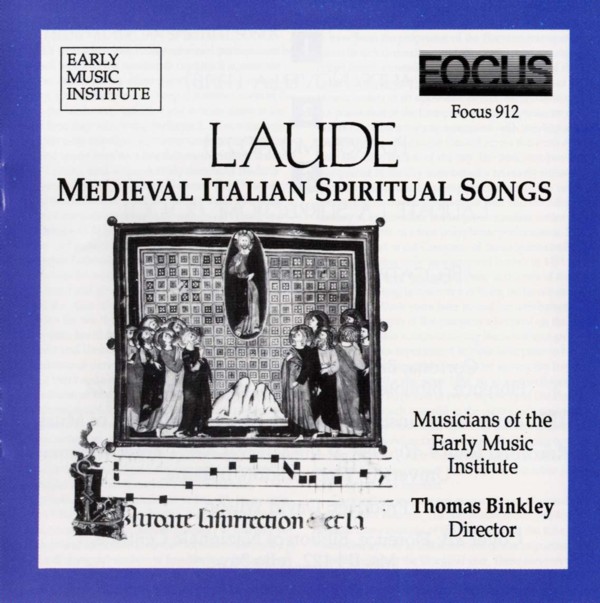
medieval.org
Focus 912
junio de 1988
Musical Arts Center, Indiana University, Bloomington, Indiana
01 - Laude Novella [11:18]
02 - Plangiamo [10:27]
03 - Laudate La Surrectione [10:03]
04 - Peccatrice, Nominata [11:15]
Musicians of the
EARLY MUSIC INSTITUTE
Indiana University School of Music
Thomas Binkley
Maria Goncalves, singer
Matthew Pass, singer
Todd Field, lute
David Greenberg, vielle
Luca Pellegrini, recorder
fuentes:
Cortona, Biblioteca del Comune, Ms. 91.
Florence, Biblioteca Nazionale Centrale, Ms. II 1122
At a time when historically informed performance has pressed well into the nineteenth century, it is none too soon to turn to Italy's oldest repertory of sung vernacular poetry. Unlike the medieval song repertories north of the Alps, the laude were collected and written down at the same time they were being performed. Most often only the texts were recorded, but two sources containing both text and music survive, a late thirteenth-century laudario from Cortona, and a sumptuously decorated laudario from early fourteenth-century Florence. The 134 songs of these two collections are characterized by great beauty and directness of expression, by surprising variety and virtuosity, and in performance they exude the ardent devotion and passionate spirituality that the mendicant friars inspired among the urban laity of late medieval Italy.
....
The laude were clearly a form of lyrical praise and devotion, directed to the various saints with whom the companies cultivated sacred relationships, but the texts also indicate another, more earthly function - like mendicant sermons they were intended to actively engage the imaginations of lay listeners and instruct them in the faith. Mendicant sermon and lauda alike relied upon scripture, moralized image, narration, direct and sensuous language, and rhymed verse, and both prepared the listener for confession. Throughout both runs a fundamental dichotomony in mendicant spirituality between penance ('Plangiamo...') and praise ('Laudate...'), which the great Dominican theologian St. Thomas Aquinas described as the twin fruits of devotion. It was for these reasons that eclesiastical indulgences were granted for both the singing and hearing of laude. It is for these reasons that we must not doubt that the musical presentations of these vivid, narrative texts would have been any less dramatic and stirring than the rhetorically flamboyant mendicant sermons to which the laity flocked.
Blake Wilson, Vanderbilt University